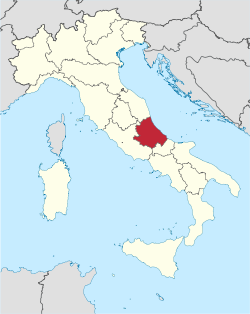Abruzzo
|
Abruzzo |
|||
|---|---|---|---|
| Region of Italy | |||
|
|||
 |
|||
| Country | Italy | ||
| Capital | L'Aquila | ||
| Government | |||
| • President | Luciano D'Alfonso (Democratic) | ||
| Area | |||
| • Total | 10,763 km2 (4,156 sq mi) | ||
| Population (2012-10-30) | |||
| • Total | 1,307,919 | ||
| • Density | 120/km2 (310/sq mi) | ||
| Demonym(s) | Abruzzan(s) / Abruzzese / Abruzzesi | ||
| Time zone | CET (UTC+1) | ||
| • Summer (DST) | CEST (UTC+2) | ||
| GDP/ Nominal | €28.7 billion (2008) | ||
| GDP per capita | €21,400 (2008) | ||
| NUTS Region | ITF | ||
| Website | www.regione.abruzzo.it | ||
Abruzzo (pronounced [aˈbruttso]) is a region of Italy in Southern Italy, with an area of 10,763 square km (4,156 sq mi) and a population of 1.3 million. Its western border lies 80 km (50 mi) east of Rome. The region is divided into the four provinces of L'Aquila, Teramo, Pescara, and Chieti. Abruzzo borders the region of Marche to the north, Lazio to the west and south-west, Molise to the south-east, and the Adriatic Sea to the east. Geographically, Abruzzo is divided into a mountainous area to the west, which includes the Gran Sasso D'italia, and a coastal area to the east with beaches on the Adriatic sea. Abruzzo is considered culturally, linguistically, and historically a region of Southern Italy, although geographically it may also be considered central. The Italian Statistical Authority (ISTAT) deems it to be part of Southern Italy, partially because of Abruzzo's historic association with the Kingdom of the Two Sicilies.
Abruzzo is known as "the greenest region in Europe" as one third of its territory, the largest in Europe, is set aside as national parks and protected nature reserves: there are three national parks, one regional park, and 38 protected nature reserves. These ensure the survival of 75% of Europe's living species including rare species, such as the small wading dotterel, golden eagle, the Abruzzo (or Abruzzese) chamois, Apennine wolf, and Marsican brown bear. Abruzzo is also home to Calderone, Europe's southernmost glacier.
...
Wikipedia


